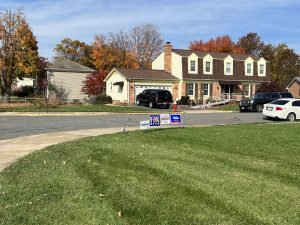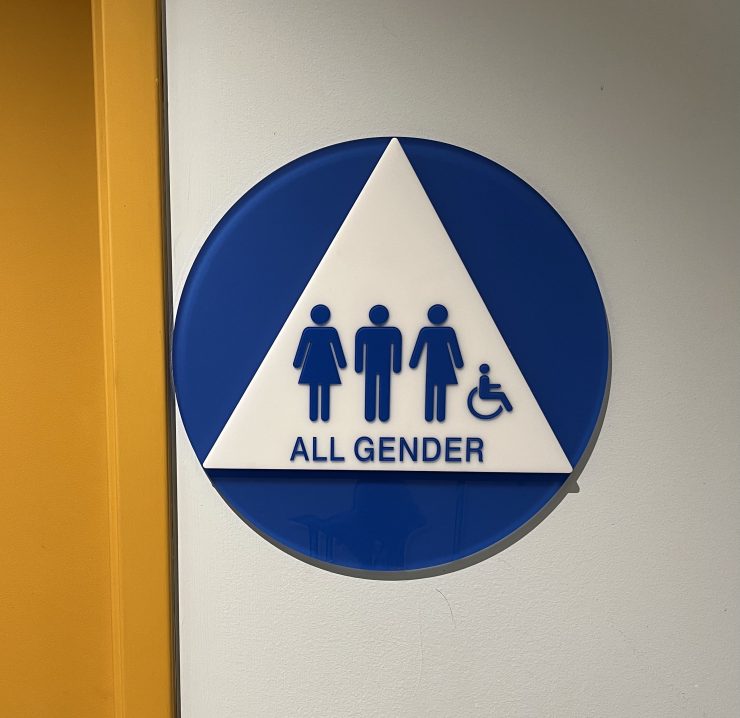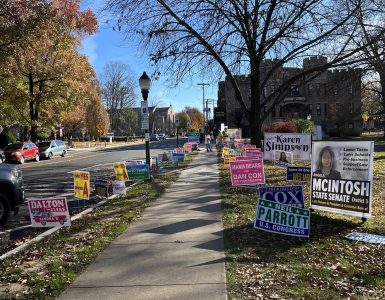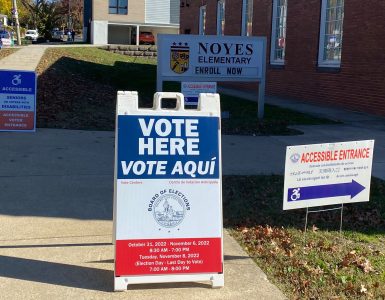While voters in Loudoun County, Virginia, won’t find transgender students’ rights directly on the ballot, the subject is being debated statewide due to a series of state and local actions.
In September, Virginia Gov. Glenn Youngkin outlined his proposal, directing the state’s 133 school districts to adopt guidelines about transgender students.
The guidelines determine which facilities students can use (only those that match their gender assigned at birth); whether students can request to change their names or listed gender (not without family approval); and direct school staff to not use a student’s preferred name or pronoun unless their parents approve.
Opponents say the changes would endanger transgender students and damage the relationship between educators and students.
The policies “talk about parental rights and it’s really centering the entire conversation that we have seen in District 10 around this idea of parental rights versus transgender rights,” said Cris Candice Tuck, a transgender parent in Loudoun County, Va., part of District 10.
Youngkin and his supporters, including Republican candidates running for election in the District, said that the changes would restore decision-making to parents, where they say it belongs.
Policies on hold
The guidelines did not go into effect as planned, which could have been as early as last week. A 30-day public comment period drew more than 71,000 comments, prompting the state board of education to take time to review and potentially revise the guidelines based on input.
In addition, the measure received several comments saying the model policies contradict existing state law, delaying its’ implementation 30 days, per a state regulation.
Tuck said Equality Loudoun, a nonprofit organization that works for LGBTQ+ equality in Loudoun County, filed a legal objection to the model policies in late October.
If the model policies go into effect, it is up to each school district to comply, but there is no enforcement mechanism.
Loudoun in the middle
Loudoun finds itself at the center of this debate due to the introduction of Youngkin’s state policies at the same time as several high-profile incidents involving transgender students in Loudoun over the last two years.
In 2021, a Loudoun teacher was placed on leave for refusing to use transgender students’ pronouns. The teacher sued Loudoun County Public Schools and was eventually reinstated following a decision by the Virginia Supreme Court.
In addition, two Loudoun school board races are focused on how transgender students are treated in schools; candidates for the open school board seats, in Broad Run and Leesburg, are facing the fallout from how the school district handled two student sexual assault cases last year that sparked national attention.
Transgender issues have also been emphasized in the campaigns of the candidates running for US Congress.

Democrat incumbent Jennifer Wexton is facing Republican Hung Cao, a retired Navy captain. While the Cook Political Report considers the 10th District a likely Democrat-voting district, Cao has received significant support from Youngkin and Republican voters in the area.
In an early October debate, Cao referred to the issue of transgender students as one of parents’ rights, using similar language to Youngkin. “That right belongs to the parents always, always, always,” he said. “I mean, a school can’t even give your kid an aspirin, but you’re saying that school can decide what sex your child is?”
In the same debate, Wexton said that parents could and should be involved in decisions regarding their children. She noted, however, that some parents are not always accepting of their children.
“In a perfect world, we would see parents who are caring and loving and take care of their kids, but we’re not seeing that in all instances,” Wexton said.
Wexton also pointed out that Youngkin’s model policies would allow teachers to refuse to abide by a parent’s request that their child be called by their preferred names and pronouns if the teacher does so on religious grounds.
Views from the District
Sandy Sullivan, an elementary school teacher in Loudoun County, is the president of the Loudoun Education Association, a nonprofit advocacy organization for Loudoun public school educators.
The association’s Political Action Committee endorsed Nick Gothard for the Broad Run seat and Erika Ogedegbe for the Leesburg seat because they are the candidates that will do what is best for students, according to Sullivan. Sullivan said the potential impact of Youngkin’s proposed policy “would be very chilling.”
“All educators certainly want parents’ input, right?” Sullivan said. “Teachers can’t do it alone. Student success in the school system can’t be done without parent input, but what came about in that proposed guidance from Gov. Youngkin was really kind of splitting the support system for students in half,” she said.
Stephen Farnsworth, a political scientist at the University of Mary Washington, said the focus on local school issues is a smart campaign choice for Republicans.
“The conversation about issues of trans students is a great way to create energy among Republican voters. If you can get people motivated, that can be a very effective means of making sure that they actually turn out,” said Farnsworth.
‘Well-resourced’ people
Loudoun County is the wealthiest county in the United States according to the 2020 U.S. Census, circumstances that Tuck said make Loudoun uniquely set up for parents exerting influence over schools.
“What’s different about Loudoun County is that we have a very large group of well-resourced, well-connected and well-funded anti-LGBTQ individuals and political individuals who are pushing partisanship within Loudoun to create the national spectacle,” Tuck said.
Farnsworth said many Republicans, particularly Virginia Republicans, will likely attempt to model their behavior and rhetoric after Youngkin due to his success.
Declan Green, 33, is a transgender man who grew up in Loudoun County, graduating from Stone Bridge High School in 2007. Green said he experienced extensive bullying as a teenage girl who came out as lesbian before he eventually transitioned to male in his adult life.
Green said he is concerned that the debate on transgender students in schools will only continue to grow, given the governor’s proposed policy changes.
“I feel like as people go to the ballot over the next week or so, they are voting whether or not these policies become permanent, and whether this rhetoric becomes something of a norm amongst Loudoun County, amongst the state as a whole,” Green said.















Add comment